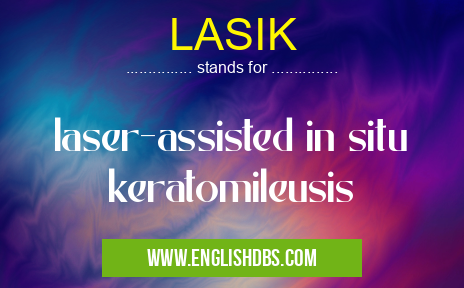What does LASIK mean in MEDICAL
LASIK is an advanced laser vision correction procedure that can be used to reduce a person's dependence on eyeglasses or contact lenses. It stands for Laser-Assisted In Situ Keratomileusis, which is a type of refractive eye surgery that has been used to improve vision in millions of people all around the world. The acronym LASIK stands for a particular type of eye surgery that uses lasers to reshape the cornea and correct refractive errors that interfere with clear vision. This procedure has helped countless individuals improve their vision and experience life without glasses or contact lenses.

LASIK meaning in Medical in Medical
LASIK mostly used in an acronym Medical in Category Medical that means laser-assisted in situ keratomileusis
Shorthand: LASIK,
Full Form: laser-assisted in situ keratomileusis
For more information of "laser-assisted in situ keratomileusis", see the section below.
Procedure
The LASIK procedure involves using a femtosecond laser (or microkeratome) to create a thin flap in the outer layer of the cornea. Next, an excimer laser is used to reshape and contour the underlying corneal tissue so it bends light more accurately onto the retina. This allows images to be focused clearly on the retina resulting in improved vision and reduced need for glasses or contacts. Lastly, the flap is replaced and allowed to heal without sutures.
Benefits
The benefits of having this procedure done are numerous. The most obvious benefit is improved vision; many patients report seeing 20/20 or better following LASIK surgery. Additionally, there is minimal discomfort during and shortly after the procedure, usually lasting only 1-2 days post-operation. Finally, recovery time for most patients is incredibly quick; patients typically notice an improvement in vision within 24 hours following their appointment.
Essential Questions and Answers on laser-assisted in situ keratomileusis in "MEDICAL»MEDICAL"
What is LASIK?
LASIK stands for laser-assisted in situ keratomileusis, a vision correction procedure that uses an excimer laser to reshape the cornea of the eye. This helps to reduce or even eliminate the need for glasses or contact lenses.
Who can benefit from LASIK?
LASIK is suitable for people with nearsightedness, farsightedness, astigmatism and presbyopia. People with these conditions may be able to improve their vision using LASIK surgery.
What happens during a LASIK consultation?
During a LASIK consultation, your eye doctor will assess your eyes to determine if you are a good candidate for the procedure. Your doctor will discuss your medical history, lifestyle habits, medications and any other health concerns that may affect the success of the procedure.
Does insurance cover LASIK?
Most insurance plans do not cover elective procedures such as LASIK surgery; however, some plans may cover a portion of the cost of the procedure. It is best to check with your insurance provider to get specific details about coverage before proceeding with the surgery.
Are there any risks associated with LASIK surgery?
With any surgical procedure comes potential risks and complications; however, corrective eye surgery such as LASIK has been proven to have excellent safety records when performed by skilled professionals in accredited facilities. Risks associated with this type of surgery include infection and loss of vision as well as dry eye syndrome or halos around lights at night time.
How long does it take to recover after LASIK surgery?
The process of recovery after undergoing refractive surgery such as corneal or lens replacement usually requires several months before full visual acuity is achieved; however, most patients experience improved clarity within only one day after their initial procedure. Depending on individual healing times and visual outcomes, most patients are able to resume all normal activities and work immediately following their operations.
Final Words:
Laser-Assisted In Situ Keratomileusis (LASIK) is a revolutionary vision correction technology that can improve your eyesight by reshaping your cornea so it focuses light correctly on your retina. With minimal discomfort and quick recovery times, LASIK can be a great way to improve your sight quickly and easily so you don't have to rely on glasses or contacts anymore!
